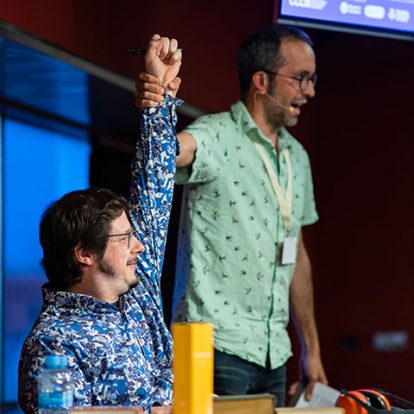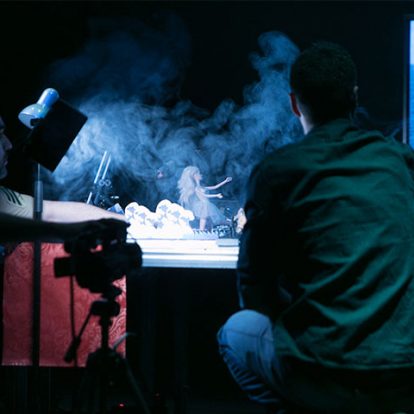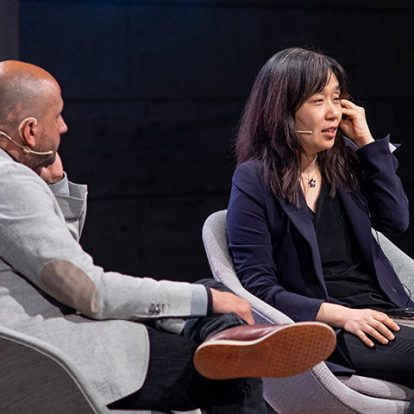Literatures for Dialogue
Eva Rexach (K Team)
10 March 2015
The K Dialogues are, for this K15, more literary than ever before. Seven chats between writers on subjects as diverse as the limits of literature, the personality of the writer, imposture, the narration of privacy or American letters. A varied menu with some of the most important names in the culture of our times.

Juan Marsé. (CC BY-SA 2.0) Elisa Cabot
There are authors whose literature will be forever linked to a character. That of Juan Marsé is bound to Pijoaparte, that charismatic lad from Guinardó who falls in love with a girl from a wealthy family, called Teresa. The entire oeuvre of Marsé is impregnated with the spirit of that character, his struggles, his anger with the injustices and his everyday life in this neighbourhood of Barcelona, which is uptown because it stands on a hill, but has nothing to do with the area where characters like Teresa live. And Marsé himself, like another – though not any other – kid from the Guinardó, is now the protagonist of the novel. Mientras llega la felicidad is the biography of Marsé written by Josep Maria Cuenca, which is the culmination of six years of research and exists thanks to the support of Jorge Herralde. The three men, Marsé, Cuenca and Herralde, will be inaugurating Kosmopolis on 18 March.
From Guinardó we’ll be travelling to Africa hand in hand with a writer and a journalist: Taiye Selasi and Xavier Aldekoa. Selasi’s work questions itself about identity based on her own biography: born in London, but brought up in the United States, and with Ghanaian and Nigerian roots, this writer – considered by the magazine Granta as one of the new voices of American literature — defines herself as “Afropolitan”: a cosmopolitan African citizen. At her side, Xavier Aldekoa, the correspondent for La Vanguardia in South Africa, will be talking about the Africas that he knows and that he tours in his chronicles: from Benin to Zimbabwe, Swaziland, Togo or Nigeria.
Impostures and family stories
In his last novel, El Impostor, Javier Cercas considers why he wrote that story and what it meant to tell it: “I said to myself that perhaps only an impostor could tell the story of another impostor and that, if I was truly an impostor, perhaps nobody could tell the story of (Enric) Marco better than I could”. Is the writer a charlatan due to the fact that he writes about the lives of others? What is fiction and what is reality in a novel? Javier Cercas himself will be discussing this with Mathias Enard, another author who also dealt with the theme of imposture in his novel Zona, which won various literary prizes in France.
Paolo Giordano and Llucia Ramis, in contrast, both write about something closer to home. In their dialogue on Family Microcosms they will be talking about the literature of the private, of how to make small things into great stories. This is the subject of the latest book by the Italian writer, Il nero e l’argento, a tale about a young family who see how their world falls apart; and it was also the subject of Todo lo que una tarde murió con las bicicletas: the story of a thirtysomething woman who returns to the home of her parents and wonders what her life is and what her relationship with her family is like.
The relationship of William T. Vollmann with literature goes far beyond simple writing. In 1982, he travelled to Afghanistan and battled on the front line of the war until dysentery took him away from the front. From that experience, he wrote An Afghanistan Picture Show, or, How I Saved the World which was the first of a series of extreme adventures which he uses as a starting point for developing his stories, based on subjects such as violence, life on the fringes of society and poverty. He will be talking about literature on the edge and the edges of literature in dialogue with Juan Francisco Ferré, winner of the Herralde Prize 2012 for Karnaval, a novel that also talks about excesses, sins and the ills of society.
Scrambled letters and novelistic feats
if Vollmann is a radical author, then Robert Coover is an unorthodox one. Creator of the Electronic Literature Organization, his literature can be defined by two adjectives: hypertext and experimental. The author of works of a very diverse nature, he has won a host of prizes for his transgressive literature and his use of language. For this reason he is being partnered with Màrius Serra, alchemist of words, wizard of letters and creator of linguistic games.

Rachel Kushner i Eduardo Lago
The visual arts, philosophy and political commitment are the references played with by Rachel Kushner, one of the new voices in American narrative. The Flamethrowers, the novel that brought her to fame, is, in the words of Eduardo Lago, “a novelistic feat” that mixes history with art. Lago knows Kushner well, as he knows American literature well after more than three decades living in New York and interviewing the best authors of our times. Kushner and Lago will be talking at Kosmopolis about the speed of fiction.









